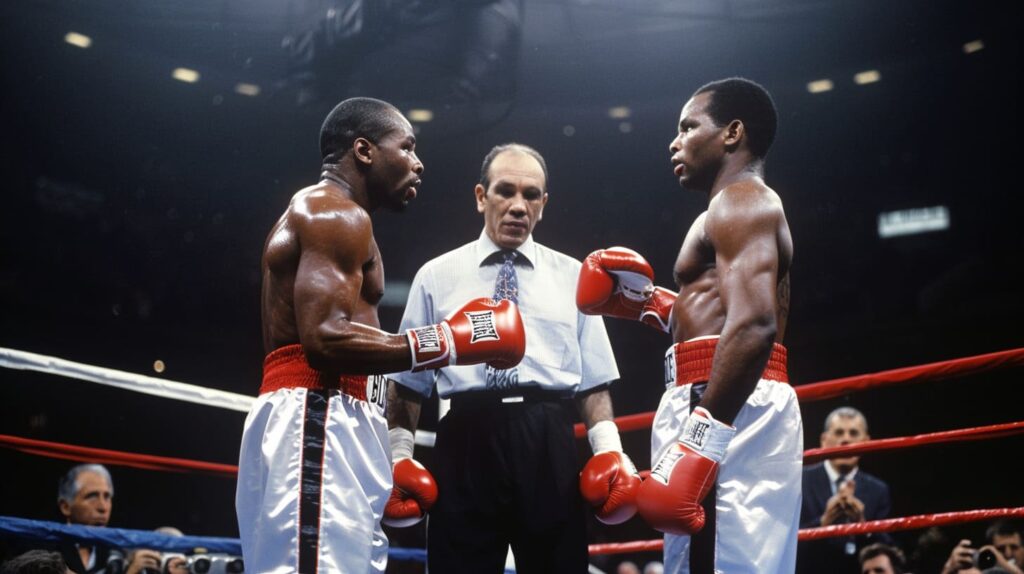The earnings of boxing referees vary based on factors like the level of the match, location, and individual experience, with top referees like Kenny Bayless commanding substantial fees.
Base salaries for boxing referees typically range from under $1,000 to over $5,000 per match, varying across regions and promotions. Plus the base pay, referees also receive match fees, which can be around $500 to $1,000 per fight. What sets apart the earnings for referees are the pay-per-view bonuses they can potentially earn, especially when officiating high-profile bouts with significant viewership. For instance, officiating title fights often comes with lucrative bonuses that can substantially boost a referee’s total income.
Salary Range for Boxing Referees
The salary range for boxing referees can span from modest earnings for entry-level officials to substantial incomes for experienced professionals, especially in organizations like the World Boxing Union.
Entry-level boxing referees typically start off earning around $300 to $800 per match, with opportunities to officiate local bouts and amateur events. As referees gain experience and build their reputation, they may progress to officiating regional and national competitions, where pay can range from $1,000 to $3,000 per match.
Seasoned boxing referees who are trusted with high-profile matches, such as championship fights or major boxing events, can command significantly higher fees, sometimes reaching up to $25,000 or more per fight. These top referees may also secure annual contracts with organizations, ensuring a steady and lucrative income stream over the course of their careers.
Factors That Affect Salary
Several factors influence the salary of boxing referees, including the prestige of the bout, the fighters involved, and the championship status of the match.
Boxing referees have a demanding role that requires a high level of expertise and professionalism. Events of great significance like world title fights often draw top referees who command higher compensation due to the pressure and responsibility involved.
For instance, experienced referees such as Kenny Bayless and Tony Weeks are known for officiating major bouts featuring legendary fighters like Floyd Mayweather Jr. and Manny Pacquiao. These high-profile matches not only raise the stakes for the boxers but also enhance the reputation and earnings of the referees.
How Do Boxing Referees Get Paid?

Boxing referees receive payment based on a predetermined scale or percentage of the purse, with the Nevada State Athletic Commission often overseeing the payment process.
Fixed pay scales are common arrangements for referees in boxing, ensuring that they receive a set amount for every event they officiate. On the other hand, some referees opt for a percentage-based system, where they earn a fraction of the total fight purse. This setup incentivizes referees to officiate high-stakes matches, as their earnings directly correlate with the magnitude of the event.
The regulatory oversight provided by organizations like the Nevada State Athletic Commission not only ensures that referees are compensated fairly but also works to maintain the integrity of the sport. Referees must adhere to strict guidelines and standards set forth by these organizations, further reinforcing the professionalism and accountability within the sport of boxing.
Do Boxing Referees Receive Any Other Benefits?
Plus their official compensation, boxing referees may receive benefits like travel allowances, accommodation arrangements, and access to exclusive events or sponsorships.
Travel allowances often cover expenses such as flights, hotels, and meals for out-of-town matches, making it easier for referees to focus on their officiating duties without worrying about logistics.
Accommodation arrangements ensure that referees have comfortable and convenient places to stay during these events. Referees may have the chance to forge partnerships with well-known brands or companies, leading to additional income opportunities and increased exposure in the sports industry.
Comparison to Other Sports Referees

When comparing boxing referee earnings to other sports, such as soccer or basketball, the compensation structures differ significantly, with notable variations in referee fees between regions like the US, the UK, and Europe.
Boxing Referees vs. MMA Referees
Boxing referees and MMA referees have distinct roles and responsibilities, with boxing officials focusing on specific rules and techniques unique to the sport, while MMA referees handle a broader range of disciplines and combat scenarios.
Boxing referees typically oversee matches where fighters use boxing gloves and are guided by the rule set established by boxing federations like the WBC, WBA, and IBF. Their primary focus is on monitoring punches, knockdowns, and ring control, ensuring fair play and fighter safety.
On the other hand, MMA referees navigate a more complex environment, monitoring a mix of striking, grappling, submissions, and ground work. MMA referees must be knowledgeable in various martial arts styles such as Brazilian Jiu-Jitsu, Muay Thai, and wrestling to effectively officiate.
Boxing Referees vs. Football Referees
In contrast to football referees who oversee team sports with continuous gameplay, boxing referees manage individual combat encounters with discrete rounds and specific regulations, necessitating a different approach to officiating.
One of the key distinctions between boxing referees and football referees lies in the match format. Football referees are responsible for maintaining order and enforcing the rules throughout the entirety of a dynamic, flowing game, while boxing referees are focused on overseeing specific rounds of intense one-on-one combat. This difference in match structure greatly influences how each type of referee approaches their role on the field or in the ring.
How to Become a Boxing Referee

Becoming a boxing referee entails meeting educational and training prerequisites, followed by obtaining certification and licensing through recognized boxing organizations or commissions.
Prospective boxing referees must typically have a high school diploma or equivalent, although having some college education can be beneficial. To gain practical experience and knowledge of boxing regulations and protocols, aspiring referees often enroll in training programs offered by boxing associations or training facilities.
Upon completion of training, individuals can pursue certification by taking exams administered by boxing regulatory bodies or commissions. Certification requirements may vary by organization but often include passing written exams, demonstrating understanding of rules, and showing proficiency in officiating bouts.
Some examples of well-known entities that provide certification for boxing referees include the Association of Boxing Commissions (ABC) and individual state athletic commissions.
Education and Training Requirements
Prospective boxing referees often undergo formal education in sports officiating, complemented by practical training in boxing rules, ring management, and emergency response protocols.
Typically, individuals looking to become boxing referees need to have a solid foundation in officiating principles which cover rules interpretation, decision-making skills, and conflict resolution techniques. Courses in physical conditioning are also essential as referees need to be physically fit to keep up with the fast-paced nature of boxing matches.
Practical experience in refereeing boxing matches plays a crucial role in honing their skills. This hands-on training allows aspiring referees to familiarize themselves with the nuances of the sport, learn how to make quick and accurate judgments, and gain confidence in managing the intricacies of a bout.
Certification and Licensing Process
To receive official certification and licensing as a boxing referee, candidates must demonstrate proficiency in rules interpretation, decision-making, and ring control under the scrutiny of established boxing authorities.
One of the key evaluation procedures that aspiring boxing referees go through is the assessment of their ability to interpret and apply the rules of boxing accurately during matches.
Practical examinations are conducted to evaluate their decision-making skills in real-time situations, assessing how they handle various scenarios that may arise in the ring.
Ongoing education requirements are mandated by boxing governing bodies to ensure that referees stay updated on rule changes, safety protocols, and emerging trends in the sport.
Tips for Aspiring Boxing Referees

For those aspiring to become boxing referees, it is essential to study the sport’s rules meticulously, cultivate sharp observational skills, and practice quick decision-making under pressure.
Rule memorization is crucial as a boxing referee; knowing the nuances of fouls, scoring criteria, and procedural guidelines is paramount for making accurate calls during a match. Honing situational awareness is key – being able to anticipate movements, assess fighter conditions, and navigate the dynamics of a bout can help maintain order and safety in the ring.
Effective communication with fighters is another vital aspect; conveying instructions clearly, addressing concerns promptly, and staying composed in high-intensity situations can earn respect and cooperation from the athletes. Learning how to handle challenging scenarios, such as conflicts between competitors, unruly behavior, or injuries, requires a blend of confidence, diplomacy, and a calm demeanor to maintain control and ensure fair outcomes.
Conclusion
The compensation landscape for boxing referees reflects a balance between the demands of the role, the significance of the matches officiated, and the professional experience brought to each assignment.
Boxing referee salaries can vary widely, ranging from a few hundred dollars for local bouts to thousands for high-profile championship matches. Factors such as reputation, expertise, and the level of competition can greatly influence a referee’s pay grade. Career progression in officiating boxing matches often involves starting at the local level, gaining experience, and gradually moving up to more prestigious events.
The intricacies of boxing regulations and the ability to make split-second decisions under pressure play a crucial role in determining a referee’s standing in the profession. While boxing officiating can be a challenging and rewarding career, it requires continuous skill development and adaptability to the ever-evolving dynamics of the sport.
Final Thoughts on Boxing Referee Salaries
The discussion on boxing referee salaries underscores the importance of recognizing and fairly compensating the pivotal role referees play in ensuring the integrity and safety of boxing matches.
Equitable pay structures in the realm of boxing referee careers go beyond just financial compensation. Transparent compensation policies not only reflect a commitment to fairness but also instill trust and credibility within the sport’s regulatory framework. Referees are not merely enforcers but guardians of the rules, responsible for upholding the spirit of the sport. Their expertise and quick decision-making abilities contribute significantly to the smooth flow and proper conduct of matches, ultimately enhancing the overall spectator experience and the reputation of boxing as a whole.
Frequently Asked Questions
How much salary do boxing referees earn?
FAQ:
Boxing referees receive varying salaries depending on their experience and level of competition. On average, they earn around $25,000 to $45,000 per year.
What factors affect the salary of boxing referees?
FAQ:
The main factors that affect the salary of a boxing referee include their level of experience, the level of competition they officiate, and the location of the fight. Top referees who officiate world title bouts typically earn higher salaries.
Do boxing referees receive any additional benefits?
FAQ:
Aside from their base salary, boxing referees may receive additional benefits such as travel expenses, accommodation, and per diem when they officiate fights outside of their home state or country.
How do boxing referees get paid?
FAQ:
Boxing referees are typically paid by the fight promoter or the boxing commission they work for. They may also receive a percentage of the total ticket sales or pay-per-view revenue from the fight.
Do boxing referees have opportunities for salary advancement?
FAQ:
Yes, boxing referees can earn higher salaries as they gain more experience and officiate bigger fights. They may also pursue additional training and certifications to become eligible for higher-paying positions.
Can boxing referees earn a full-time salary?
FAQ:
It is possible for boxing referees to earn a full-time salary, but it depends on the frequency and level of competition they officiate. Most referees work part-time and have other jobs or sources of income.

